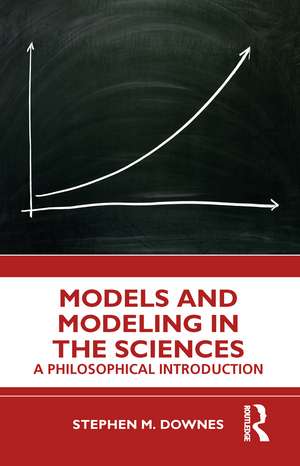Models and Modeling in the Sciences: A Philosophical Introduction
Autor Stephen M. Downesen Limba Engleză Paperback – 10 iul 2020
This book first presents a wide range of models from a number of different scientific disciplines. After assembling some illustrative examples, Downes demonstrates how models shed light on many perennial issues in philosophy of science and in philosophy in general. Reviewing the range of views on how models represent their targets introduces readers to the key issues in debates on representation, not only in science but in the arts as well. Also, standard epistemological questions are cast in new and interesting ways when readers confront the question, "What makes for a good (or bad) model?"
All examples from the sciences and positions in the philosophy of science are presented in an accessible manner. The book is suitable for undergraduates with minimal experience in philosophy and an introductory undergraduate experience in science.
Key features:
- The book serves as a highly accessible philosophical introduction to models and modeling in the sciences, presenting all philosophical and scientific issues in a nontechnical manner.
- Students and other readers learn to practice philosophy of science by starting with clear examples taken directly from the sciences.
- While not comprehensive, this book introduces the reader to a wide range of views on key issues in the philosophy of science.
| Toate formatele și edițiile | Preț | Express |
|---|---|---|
| Paperback (1) | 355.91 lei 6-8 săpt. | |
| Taylor & Francis – 10 iul 2020 | 355.91 lei 6-8 săpt. | |
| Hardback (1) | 759.96 lei 6-8 săpt. | |
| Taylor & Francis – 10 iul 2020 | 759.96 lei 6-8 săpt. |
Preț: 355.91 lei
Nou
Puncte Express: 534
Preț estimativ în valută:
68.10€ • 70.26$ • 56.83£
68.10€ • 70.26$ • 56.83£
Carte tipărită la comandă
Livrare economică 26 martie-09 aprilie
Preluare comenzi: 021 569.72.76
Specificații
ISBN-13: 9781138122239
ISBN-10: 1138122238
Pagini: 114
Ilustrații: 1 Tables, black and white; 27 Line drawings, black and white; 3 Halftones, black and white; 30 Illustrations, black and white
Dimensiuni: 129 x 198 x 12 mm
Greutate: 0.13 kg
Ediția:1Adnotată
Editura: Taylor & Francis
Colecția Routledge
Locul publicării:Oxford, United Kingdom
ISBN-10: 1138122238
Pagini: 114
Ilustrații: 1 Tables, black and white; 27 Line drawings, black and white; 3 Halftones, black and white; 30 Illustrations, black and white
Dimensiuni: 129 x 198 x 12 mm
Greutate: 0.13 kg
Ediția:1Adnotată
Editura: Taylor & Francis
Colecția Routledge
Locul publicării:Oxford, United Kingdom
Cuprins
Preface 1. Introduction 2. Models in the Sciences 3. Characterizing and Classifying Models 4. Models and Representation 5. What Makes for a Good (or Bad) Model? 6. Conclusion: Pluralism about Models, Modeling, and Model Evaluation
Notă biografică
Stephen M. Downes is Professor of Philosophy at the University of Utah, USA. He has published articles on the philosophy of biology, the biology of human behavior, and scientific models. He is co-editor, with Edouard Machery, of Arguing about Human Nature (Routledge, 2013).
Recenzii
CHOICE Highly Recommended:
"In this short but thorough and informative work, Downes provides a detailed, judicious overview of the nature of scientific models as fundamental components of the sciences and of the processes of modeling as an essential aspect of scientific practice. As part of elucidating the depth and range of models and modeling, Downes provides examples and types of models across multiple disciplines, including biology, physics, psychology, and economics. . . . Summing up: Highly recommended. Lower- and upper-division undergraduates. Graduate students, faculty, and professionals. Students in two-year technical programs."
D. B. Boersema (Pacific University) in Choice
Reprinted with permission from CHOICE http://www.choicereviews.org, copyright by the American Library Association
"In this short but thorough and informative work, Downes provides a detailed, judicious overview of the nature of scientific models as fundamental components of the sciences and of the processes of modeling as an essential aspect of scientific practice. As part of elucidating the depth and range of models and modeling, Downes provides examples and types of models across multiple disciplines, including biology, physics, psychology, and economics. . . . Summing up: Highly recommended. Lower- and upper-division undergraduates. Graduate students, faculty, and professionals. Students in two-year technical programs."
D. B. Boersema (Pacific University) in Choice
Reprinted with permission from CHOICE http://www.choicereviews.org, copyright by the American Library Association
Descriere
Downes explores the use of models in the fields of biology, climate science, economics, and more, to introduce readers to the various philosophical issues that arise in scientific modeling.
